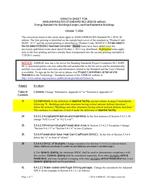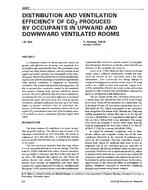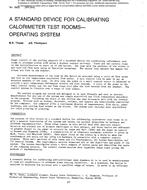Click here to purchase
Water heating is a major contributor to building energy consumption and carbon emissions in the United States, especially for residential buildings and Hotel/Motel sector in commercial buildings. Various factors in the design and operation stages are found to have significant influences on the hot water usage and associated energy usage. There has been an increased number of studies on optimizing the design and sizing of the water heating system in buildings in recent years. However, most of these studies focused on the collection and analysis of the actual data of hot water usage with rare acknowledgments of uncertainties from a variety of influential parameters such as occupant behaviors, operational schedules, etc. The current understanding of the sensitivity of the hot water usage related to those influential factors is still limited. This paper used a whole building simulation software (i.e., EnergyPlus) to investigate the behavior of the domestic hot water (DHW) usage in hotels. Sensitivity analysis (SA) was utilized to interpret the simulation results. A commercial prototype building model developed by the U.S. Department of Energy was used for the case study. The selected building is a six-story large hotel with five locations (i.e., Miami in FL, San Francisco in CA, Houston in TX, Chicago in IL, and Burlington in VT). Three thousand EnergyPlus Monte Carlo simulations were conducted for each location. Annual and peak water and energy consumptions associated with the hot water usage were selected for the study of impacts of key parameters on the hot water usage. These key parameters included both time-varying ones (i.e., DHW draw schedules) and time-independent ones (e.g., heater thermal efficiency, temperature setpoints, and tank volume). Two sensitivity indicators (i.e., Sobol and PEAR index) were computed for the sensitivity analysis of the simulation results to reveal the correlations between the hot water energy use and these input parameters. This study facilitates the design and optimization of the domestic hot water system, and supports the intelligent operation of the daily hot water system in an energy-efficient and effective way.
Citation: 2019 Winter Conference, Atlanta, GA, Conference Papers
Product Details
- Published:
- 2019
- Number of Pages:
- 10
- Units of Measure:
- Dual
- File Size:
- 1 file , 3.2 MB
- Product Code(s):
- D-AT-19-C051


